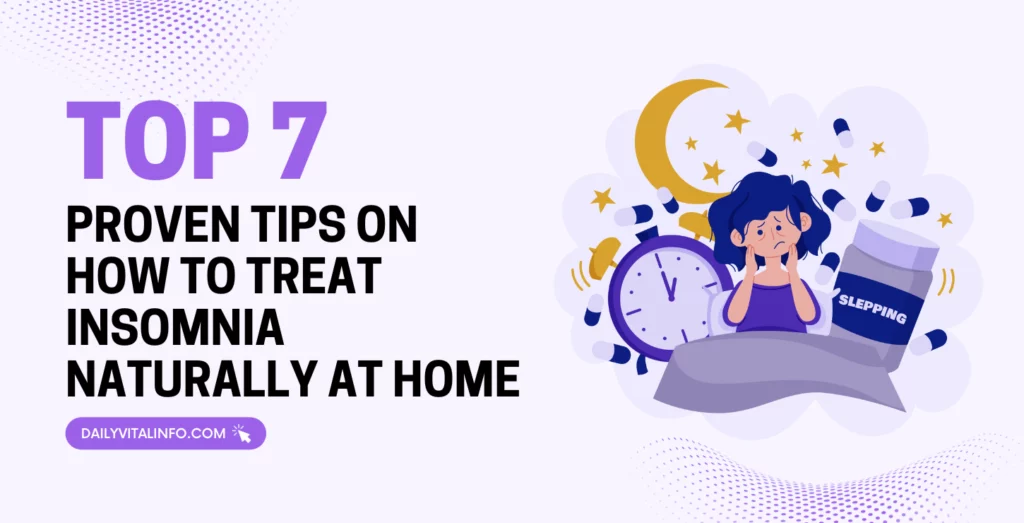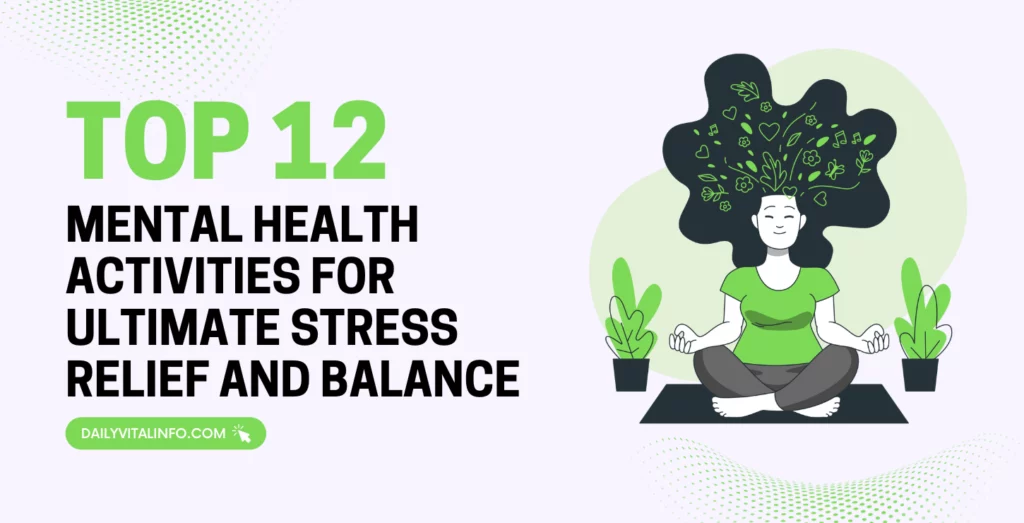If you’re looking for ways how to treat insomnia naturally, consider setting up a consistent sleep routine and creating a calming pre-sleep ritual. These steps can make a real difference in your sleep quality and help maintain your body’s natural sleep rhythm.
Creating a peaceful sleep environment, avoiding stimulating substances like caffeine before bed, and managing stress through relaxation techniques can also contribute to better sleep. Making small lifestyle changes, such as regular exercise and avoiding napping during the day, can also support natural sleep.
Integrating these natural remedies into your routine promotes healthier and more restful sleep without needing medication.

1. Maintain A Regular Sleep Schedule
Maintain a regular sleep schedule to naturally treat insomnia and regain a restful night’s sleep. Consistency in sleep timings helps regulate your body’s internal clock, promoting better sleep quality and reducing insomnia symptoms.
Getting adequate and quality sleep is crucial for our overall well-being. Establishing a regular sleep schedule is one effective way to improve your sleep patterns. This means going to bed and waking up simultaneously every day, even on weekends. It helps regulate your body’s internal clock, improving sleep quality and duration.
Here are some tips to maintain a regular sleep schedule:
- Set a consistent bedtime: Choose a time when you usually feel tired, ensuring you have enough hours for a restful sleep.
- Wake up at the same time every day: Be consistent, even on weekends, to set your body clock accurately.
- Avoid napping: If you have trouble sleeping at night, it’s best to avoid daytime napping, which can disrupt your sleep schedule.
- Create a bedtime routine: Develop a relaxing routine before sleep, such as reading a book, taking a warm bath, or practicing meditation, to signal your body that it’s time to wind down.
- Create a sleep-friendly environment: Make sure your bedroom is cool, dark, and quiet, creating the ideal conditions for a restful sleep.
- Limit exposure to screens before bedtime: The blue light emitted by electronic devices can interfere with sleep. Avoid using screens for at least an hour before bed.
- Be mindful of caffeine and food intake: Avoid consuming caffeine and heavy meals close to bedtime, as they can disrupt your sleep.
By maintaining a regular sleep schedule, you’re not only improving your quality of sleep but also enhancing your overall health and well-being. Try it and establish a routine that works best for you, sticking to it consistently. You’ll soon notice a positive difference in both the duration and quality of your sleep.
2. Create A Restful Environment
Create a restful environment to treat insomnia naturally. Prepare your bedroom with low lighting, eliminate noise, and establish a relaxing bedtime routine to promote better sleep.
Creating a Restful Environment is crucial in promoting quality sleep and combating insomnia. By optimizing your surroundings, you can enhance relaxation and create the ideal conditions for a good night’s rest.
Here are some essential steps you can take to establish a restful environment:
1. Dim The Lights:
- Utilize soft, warm lighting in your bedroom to create a soothing ambiance.
- Consider installing dimmer switches or using lampshades to control the brightness of your lights.
- Avoid bright screens, such as smartphones or computers, at least one hour before bedtime.
2. Eliminate Noise:
- Use earplugs or a white noise machine to block out disruptive sounds.
- Consider investing in heavy curtains or soundproofing your bedroom to minimize external noise.
- Opt for a comfortable mattress and pillows that provide adequate support to reduce noise from creaking or shifting.
3. Maintain Comfortable Temperature:
- Ensure your bedroom is at an optimal temperature, generally between 60°F and 67°F (15°C-19°C), to promote quality sleep.
- Use blankets or bedding appropriate for the season to help regulate your body temperature.
- Consider using a fan or air conditioner in a warmer climate.
4. Declutter And Organize:
- Keep your bedroom neat and free of clutter to promote a sense of calm and relaxation.
- Create designated areas for personal belongings to maintain an organized space.
- Consider incorporating storage solutions, such as baskets or shelves, to keep items out of sight.
5. Incorporate Aromatherapy:
- Experiment with calming scents, such as lavender or chamomile, to aid in relaxation.
- Use essential oils in a diffuser, or add a few drops to your pillowcase to promote restful sleep.
- Ensure you use high-quality, pure essential oils to avoid adverse reactions.
By implementing these strategies, you can create an environment conducive to restful sleep. Remember, establishing a consistent bedtime routine and prioritizing relaxation techniques can further enhance the effectiveness of these measures. Good sleep hygiene is essential for treating insomnia naturally, so start by optimizing your sleep environment today.
3. Mind-body Relaxation Techniques
Learn how to naturally treat insomnia with mind-body relaxation techniques. Explore effective practices that promote relaxation and improve sleep quality for a restful night.
When treating insomnia naturally, incorporating mind-body relaxation techniques into your routine can be highly effective. These techniques focus on calming the mind and relaxing the body, helping you to unwind and prepare for a restful night’s sleep.
Here are some mind-body relaxation techniques you can try:
- Progressive Muscle Relaxation: This technique involves tensing and then releasing each muscle group in your body, from your head to your toes. By systematically relaxing your muscles, you promote deep relaxation and reduce physical tension.
- Deep Breathing Exercises: Deep breathing exercises can help you relax and ease anxiety. Take slow, deep breaths, inhaling deeply through your nose and exhaling slowly through your mouth. Focus on your breath as you inhale and exhale, allowing your body to relax with each breath.
- Meditation: Meditation is a powerful practice for calming the mind and reducing stress. Find a quiet and comfortable space, close your eyes, and bring your attention to your breath. Observe your breath without judgment, allowing thoughts to pass through your mind without getting caught up in them. Practice meditation for a few minutes each day to promote a sense of inner calm.
- Yoga: Combines gentle movements, deep breathing, and mindfulness to promote relaxation. Certain yoga poses, such as a child’s pose or a legs-up-the-wall pose, can help relieve tension and prepare your body for sleep. You can also try incorporating yoga into your daily routine, focusing on gentle stretches and breathing exercises.
- Guided Imagery: Guided imagery involves using your imagination to create a peaceful and calming mental picture. Close your eyes and imagine yourself in a serene and tranquil setting, such as a beach or a peaceful garden. Engage all your senses in this visualization, imagining the sights, sounds, smells, and sensations of the peaceful environment.
By incorporating these mind-body relaxation techniques into your routine, you can promote a sense of relaxation and calm that can help ease insomnia and improve sleep quality. Experiment with different techniques to find the ones that work best for you, and make them a regular part of your bedtime routine.
4. Dietary Adjustments
Dietary adjustments can play a significant role in treating insomnia naturally. Incorporating a balanced diet with foods rich in sleep-promoting nutrients, such as tryptophan and magnesium, can improve sleep quality and regulate sleep patterns.
Making certain adjustments to your diet can contribute significantly to treating insomnia naturally. Here are some dietary tips to help you get a good night’s sleep:
- Limit caffeine intake: It’s no secret that caffeine is a stimulant that can interfere with sleep. Avoid consuming coffee, tea, or energy drinks in the afternoon and evening. Opt for decaffeinated versions instead.
- Avoid heavy meals before bed: Indulging in a large, heavy meal close to bedtime can cause discomfort and make it difficult to sleep. Opt for lighter, easily digestible foods during the evening.
- Incorporate sleep-friendly foods: Certain foods can promote better sleep due to their natural properties. Consider consuming the following:
- Warm milk: Milk contains tryptophan, an amino acid that helps regulate sleep.
- Bananas: They are a good source of magnesium and potassium, which promote muscle relaxation and calm the nervous system.
- Cherries: Rich in melatonin, a hormone that regulates sleep-wake cycles.
- Almonds: These nuts are a good source of magnesium, which can promote sleep quality.
- Watch your alcohol intake: While alcohol may initially make you feel drowsy, it can disrupt your sleep later in the night. Try to avoid consuming alcohol close to bedtime.
- Stay hydrated: Dehydration can negatively impact sleep quality. Make sure to drink enough water throughout the day, but avoid excessive fluid intake before bed to prevent disruptions from frequent trips to the bathroom.
- Consider herbal teas: Certain herbal teas, such as chamomile or valerian root, can have a calming effect and promote relaxation before sleep. Incorporate them into your nighttime routine.
By adjusting your diet and making these small changes, you can improve your chances of overcoming insomnia naturally. Next, let’s explore the importance of maintaining a regular sleep schedule for better sleep.
5. Physical Activity And Exercise
Physical activity and exercise are natural ways to treat insomnia. Regular physical activity can help regulate sleep patterns and improve overall sleep quality. Incorporating moderate-intensity exercise into your daily routine is recommended for better sleep.
Natural Ways To Treat Insomnia Through Physical Activity And Exercise
Lack of physical activity and exercise can contribute to sleep problems like insomnia. Incorporating regular physical activity into your routine can have a positive impact on your sleep quality. Here are some natural ways to treat insomnia through physical activity and exercise:
Establish A Routine
- Set a regular time for exercise, aiming for at least 30 minutes each day.
- Engage in physical activity during the day to avoid exercising too close to bedtime.
Choose The Right Exercise
- Opt for low-impact exercises such as walking, swimming, or cycling.
- Incorporate moderate-intensity activities like jogging, yoga, or Pilates.
- Experiment with different exercises to find what works best for you and avoids any discomfort or pain.
Utilize Relaxation Techniques
- Practice yoga or deep breathing exercises to relax your body and mind before bedtime.
- Consider incorporating meditation or mindfulness practices into your routine to reduce stress and promote better sleep.
Avoid Strenuous Exercise Before Bedtime
- Refrain from engaging in high-intensity workouts close to bedtime, as it may increase alertness and make it harder to fall asleep.
- Allow your body sufficient time to wind down after exercise before going to bed, as it helps prepare your mind for sleep.
Get Outdoors And Explore
- Take advantage of nature and fresh air by exercising outdoors.
- Explore different activities like hiking, nature walks, or gardening, contributing to better sleep and boosting your overall well-being.
By following these natural approaches to physical activity and exercise, you may find relief from insomnia and experience improved sleep quality. Remember, it’s essential to consult with a healthcare professional before starting any new exercise regimen, especially if you have underlying health conditions.
6. Natural Sleep Aids And Supplements
Discover the effectiveness of natural sleep aids and supplements for treating insomnia. With these natural remedies, you can achieve a restful night’s sleep without relying on medication. Improve your sleep quality the natural way.
When it comes to treating insomnia naturally, there are various options available. One effective approach is to use natural sleep aids and supplements. These can help promote better sleep without the need for prescription medication or harsh chemicals. In this section, we will explore some popular natural sleep aids and supplements that have been proven to be beneficial in improving sleep quality.
Melatonin
- Melatonin is a hormone naturally produced by the body to regulate sleep-wake cycles.
- Taking melatonin as a supplement can help individuals struggling with insomnia fall asleep faster and improve overall sleep quality.
- It is especially useful for those who have disrupted sleep patterns due to travel or shift work.
Valerian Root
- Valerian root has been used for centuries as an herbal remedy for sleep disorders.
- It is believed to promote relaxation and reduce anxiety, making it easier for individuals to fall asleep.
- Valerian root supplements are available in capsule or tea form and can be consumed before bedtime.
Chamomile
- Chamomile is a popular herbal tea known for its calming properties.
- It contains flavonoids that bind to receptors in the brain, promoting relaxation and reducing sleep disturbances.
- Drinking chamomile tea before bed can help prepare the body and mind for a restful sleep.
Magnesium
- Magnesium is a vital mineral that is crucial in many bodily functions, including sleep regulation.
- Low levels of magnesium have been linked to insomnia and other sleep disorders.
- Taking magnesium supplements can help improve sleep quality and promote relaxation.
Lavender
- Lavender is a fragrant herb that is commonly used in aromatherapy for its calming effects.
- Inhaling lavender oil or using lavender-scented products before bed can help induce sleep and reduce anxiety.
- It is a natural remedy that can be used alongside other sleep aids or supplements.
Cbd Oil
- CBD oil is derived from the hemp plant and has gained popularity for its potential sleep benefits.
- Studies suggest that CBD can help reduce anxiety and promote relaxation, resulting in improved sleep quality.
- It is important to note that CBD oil should be used with caution and under the guidance of a healthcare professional.
These natural sleep aids and supplements can effectively promote better sleep and combat insomnia. However, it is essential to remember that everyone responds differently to different remedies. It is advisable to consult with a healthcare professional before starting any new supplement regimen.
With the right approach and a bit of trial and error, you can find the natural sleep aid or supplement that works best for you. Sleep tight!
7. Cognitive Behavioral Techniques
Cognitive Behavioral Techniques offer natural, effective ways to treat insomnia. By addressing negative thought patterns and modifying behaviors, these techniques can help improve sleep quality and promote long-term sleep health.
Insomnia can be a frustrating and debilitating condition that disrupts our sleep patterns and affects our overall well-being. While various treatment options are available, many people are turning to natural remedies to address the root causes of their sleep troubles.
One such approach is cognitive behavioral techniques, which aim to retrain the mind and develop healthier sleep habits. Below, we’ll explore seven effective cognitive behavioral techniques that can help you treat insomnia naturally:
1. Establish A Consistent Sleep Schedule
- Consistency is key when it comes to managing insomnia. Set a regular bedtime and wake-up time, and stick to it even on weekends.
- Maintaining a consistent sleep schedule can regulate your body’s internal clock and promote better sleep.
2. Create A Relaxing Bedtime Routine
- A calming routine before bed can signal to your body that it’s time to wind down and prepare for sleep.
- Engage in activities such as reading a book, taking a warm bath, or practicing relaxation exercises to help relax your mind and body.
3. Make Your Bedroom A Sleep-friendly Environment
- Your sleep environment plays a crucial role in the quality of your sleep. Keep your bedroom cool, quiet, and dark.
- Remove electronic devices and minimize outside distractions to create a peaceful atmosphere that promotes restful sleep.
4. Practice Sleep Restriction
- If you spend excessive time in bed and are unable to fall asleep, sleep restriction may be helpful.
- Limit the amount of time you spend in bed to the hours of sleep you get. This can help consolidate your sleep and improve its quality.
5. Challenge Negative Thoughts And Beliefs About Sleep
- Negative thoughts and beliefs about sleep can fuel insomnia. Challenge these thoughts and replace them with more positive and realistic ones.
- Reframe your mindset from “I’ll never sleep again” to “I’ve overcome sleep difficulties before, and I can do it again.”
6. Avoid Stimulants And Electronic Devices
- Stimulants like caffeine and nicotine can disrupt sleep. Limit your intake, particularly in the hours leading up to bedtime.
- Additionally, avoid using electronic devices close to bedtime, as the blue light emitted can interfere with your body’s production of sleep-inducing hormones.
7. Engage In Relaxation Techniques
- Relaxation techniques, such as deep breathing exercises and progressive muscle relaxation, can help calm your mind and prepare your body for sleep.
- Incorporate these techniques into your bedtime routine to promote relaxation and alleviate insomnia symptoms.
Integrating these cognitive-behavioral techniques into your daily routine allows you to take significant steps toward treating insomnia naturally. Remember, finding the right combination of techniques that work for you may require experimentation. Stay consistent, be patient, and consult with a healthcare professional if your sleep problems persist.
What is a good product to help you sleep?
The best ear plugs for sleeping noise canceling are designed to provide maximum comfort and block out external sounds, ensuring a peaceful and uninterrupted sleep. These earplugs are made from soft materials and fit snugly in the ear, effectively reducing noise levels to create a tranquil sleeping environment.
Their innovative design and advanced sound-blocking technology offer a superior noise-canceling experience, allowing you to sleep deeply and restfully. Say goodbye to disruptive noises and hello to a night of uninterrupted sleep with the best earplugs for noise canceling.
If you want to sleep better, there’s plenty of stuff out there to help you fall asleep faster and sleep more. Here’s a quick list of things that might change how you get ready for bed. Below is a list of the products.
| Product Name | Description | Pricing |
|---|---|---|
| Mueller MistrM Ultra | Protect Your Hearing, Sound Amplification, Rugged Design, Easy-To-Use Controls, Listen To Music | Click Here |
| Howard Leight by Honeywell Maximum Disposable Earplugs Box, 200 Pair, Orange | Highest Noise Reduction (Nrr 33), Conforms To Inner Ear, Promotes Proper Hygiene, Long-Wearing Comfort, Recommended Industries | Click Here |
| MOLDEX 6645 Sparkplugs Plug station, Earplug Dispenser (Pack of 500) | PVC-FREE, Eye-catching random color patterns, Comfortable pressure-free fit, Excellent attenuation, PVC-free | Click Here |
Top 12 Mental Health Activities for Ultimate Stress Relief and Balance
5 Proven Home Remedies for Root Cavity Treatment – Quick Relief!
FAQ: For How To Treat Insomnia Naturally
How can I naturally treat insomnia at home?
To treat insomnia naturally at home, try establishing a regular sleep schedule, creating a relaxing bedtime routine, avoiding caffeine and electronic devices before bed, exercising regularly, and creating a comfortable sleep environment. Additionally, consider trying relaxation techniques like deep breathing exercises or meditation and herbal remedies like chamomile tea or lavender essential oil.
Conclusion
To naturally treat insomnia, it’s important to prioritize sleep hygiene, establish a relaxing bedtime routine, and incorporate stress-reducing practices into your daily life. By making these small changes, you can enhance your sleep quality and overall well-being. Remember, adopting a holistic approach to managing insomnia allows you to avoid the potential side effects of medication while promoting long-term healthy sleep.
Rest easy and regain control over your sleep patterns starting tonight!


